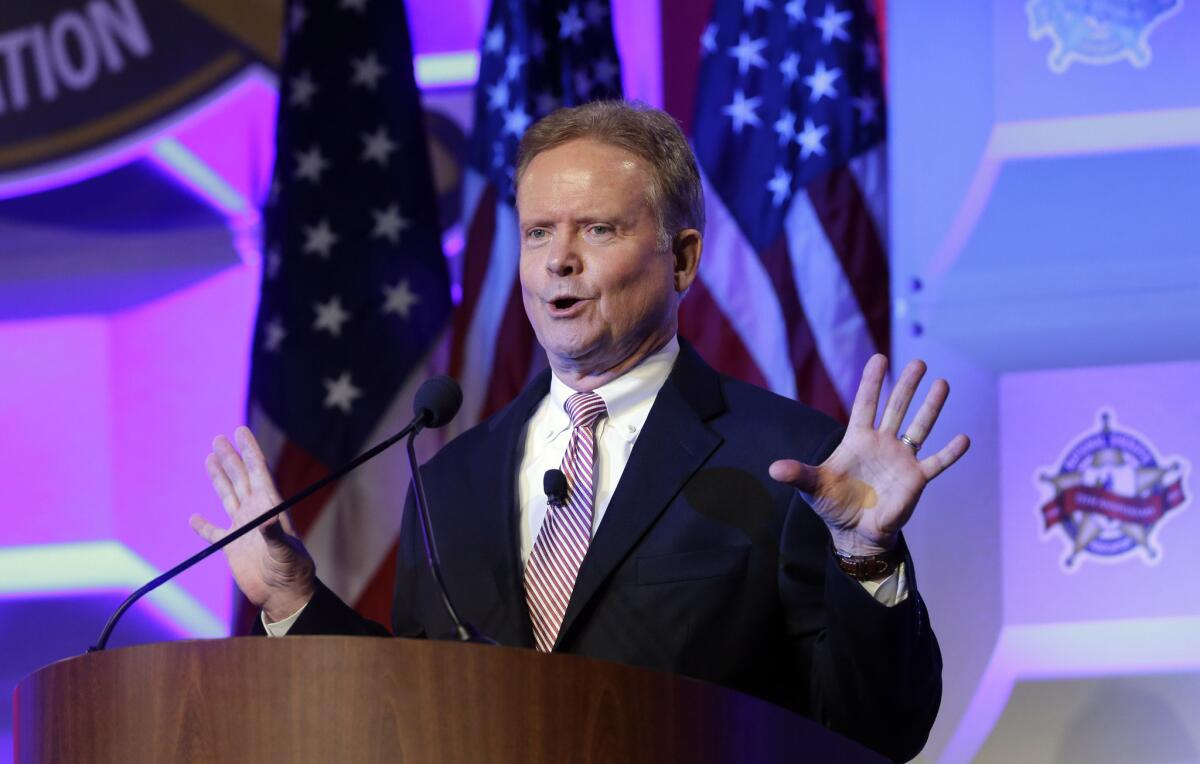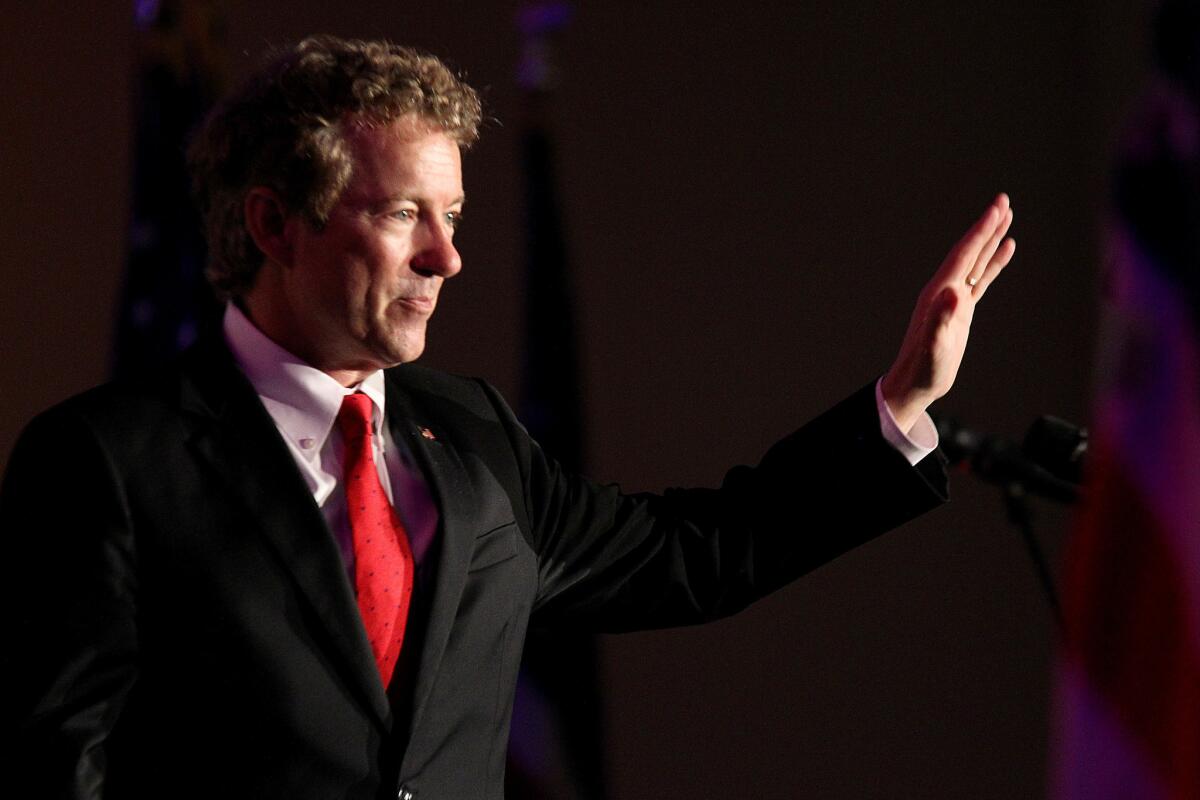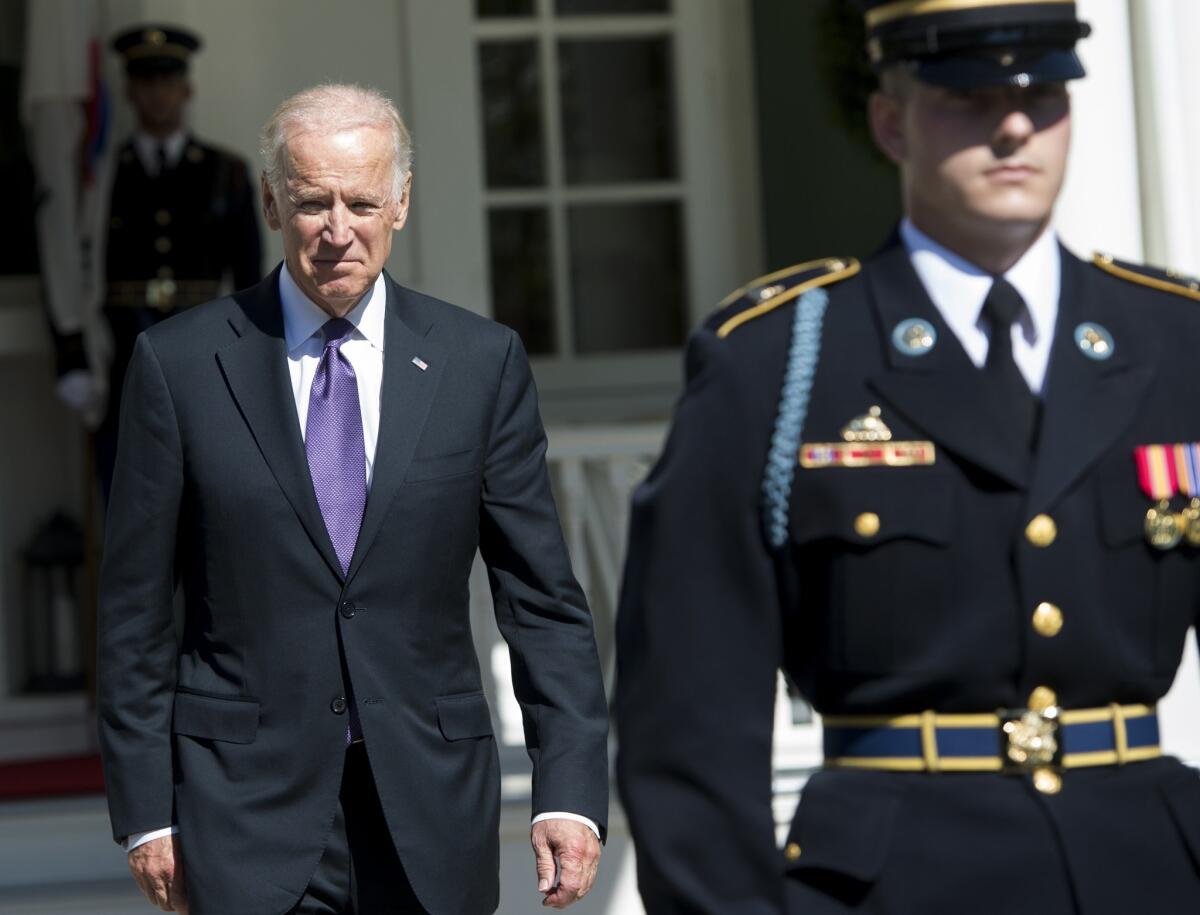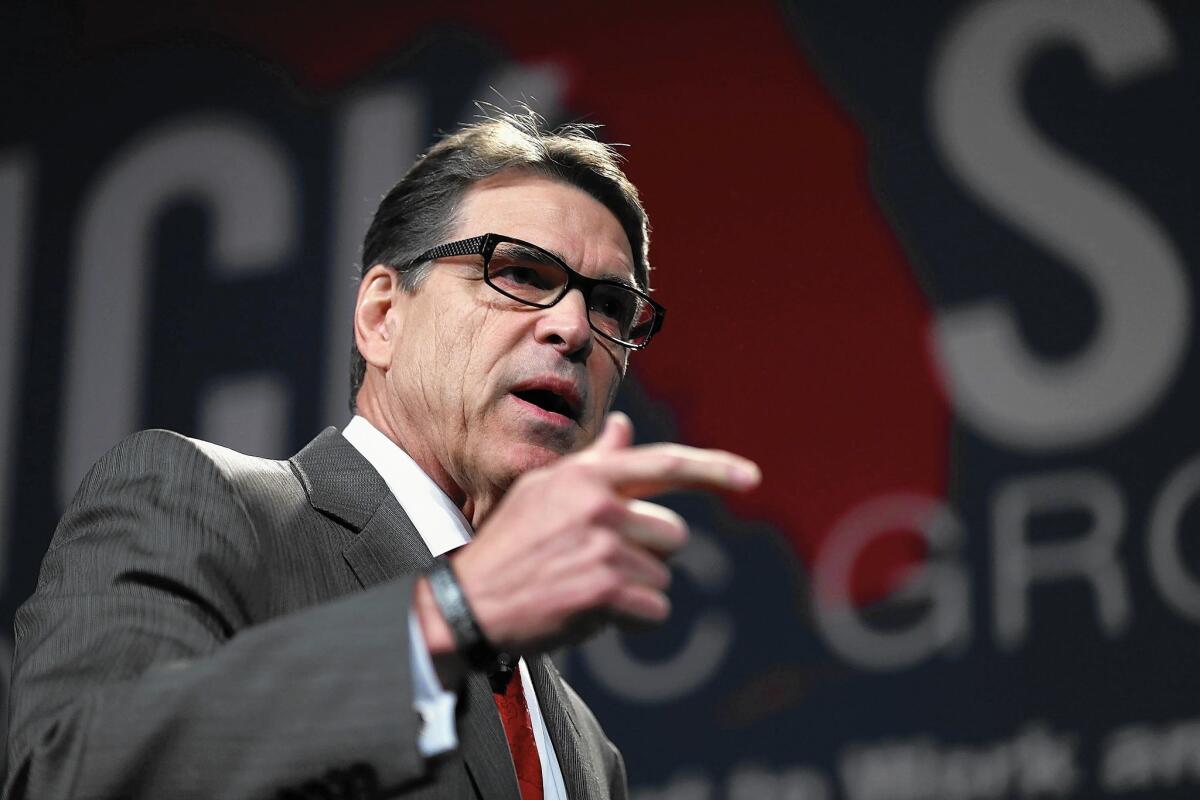Will Jim Webb exit Democratic primary and run as an independent?
By the numbers
Welcome to Trail Guide, your daily host through the wilds of the 2016 presidential campaign. It's Monday, Oct. 19, and this is what we're watching:
- For lower-tier presidential candidates, dropping out of the race can be tough. The Times' Noah Bierman explores
- Jim Webb could exit the Democratic primary and run as an independent
- New polls released Monday are a bit of good news for Hillary Rodham Clinton , notes The Times' David Lauter
- Rand Paul goes after Donald Trump and Marco Rubio in a recent CNBC interview
- What will be Vice President Joe Biden's decision? Will he run for president ? Some news outlets report a decision could come this week
- Compare the 2016 presidential candidates in this L.A. Times graphic
Jim Webb eyes a possible third-party run

Former Sen. Jim Webb of Virginia, shown at the National Sheriffsâ Assn. presidential forum in Baltimore on Tuesday, announced on his website Thursday that heâs seeking the Democratic nomination for president.
Jim Webb is a Democrat who likes to tout that he served in the administration of a Republican icon, Ronald Reagan.
So itâs perhaps no surprise that three months after entering the Democratic presidential race, with his support hovering around 1%, heâs considering exiting and waging a third-party run.
Webb, a former senator from Virginia who served as secretary of the Navy in the Reagan administration, has scheduled a news conference Tuesday in Washington to discuss a run as an independent.
An independent candidacy would require state-by-state efforts to get on ballot, a huge and expensive undertaking that Webb has few resources to accomplish. Nor has his candidacy so far demonstrated much evidence of a public demand for him as a candidate.
During last weekâs Democratic debate, Webb and former Rhode Island Sen. Lincoln Chafee were often overlooked, leading to complaints from Webb about not getting enough time.
Webb is not the only candidate who has hinted at a third-party run. Donald Trump, the Republican presidential front-runner, has also left open the door on a possible third-party run should he fail to capture the partyâs nomination.
Rand Paul targets Trump and Rubio in CNBC interview

Presidential candidate Sen. Rand Paul of Kentucky delivers the keynote speech at the Republican Party of Orange Countyâs Flag Day dinner at the Hotel Irvine.
The rise and appeal of Donald Trump in the crowded Republican presidential field can be attributed to the âcelebrity cultureâ of America, Sen. Rand Paul said Monday.
Speaking on CNBC, Paul, a first-term senator from Kentucky with deep libertarian roots who has tussled with Trump in each of the last two GOP presidential debates, said Trumpâs time as a reality television star has helped his quest for the partyâs presidential nomination.
âIt shows you that we do live in a celebrity culture. When a celebrity decides to run for office, there's somewhat, I would call, self-reinforcing news cycle. Everywhere you look, all day long he's on TV. I don't think having a reality TV star probably is going to be best for the country,â Paul said.
When asked if he believes Trump would be capable of serving as president, Paul was direct.
âI worry very much. I think I worry about someone who is so self-absorbed with their own importance and their own ability to figure out problems, that it's sort of like, âGive me power,ââ he said of the billionaire businessman. âYou know, âIf you give me power, I am so smart and I am so rich that I will fix all of America's problems.ââ
Paul also criticized fellow Sen. Marco Rubio of Florida for his support of a no-fly zone in Syria where a civil war between the government of President Bashar Assad and rebel forces has raged for more than four years.
âTerrible idea,â Paul said of a no-fly zone, noting Russiaâs presence in the country as an ally to Assad.
âSetting up a no-fly zone is a recipe for disaster. It's a recipe for confrontation. And people will say, âWell, we've got to choose sides.â Why? Assad's a bad person and so is ISIS, but we shouldn't be involved in the civil war over there.â
When Paul announced his candidacy last spring, he billed himself as a different kind of Republican, railing against the National Security Agency and calling for rewriting laws to reduce the number of people imprisoned in the U.S. On the campaign trail, he has argued that for the Republican Party to survive, it must appeal to a broader cross section of the American electorate than the older, white voters who dominate GOP presidential primaries.
So far, none of those appeals seems to have helped his candidacy. National polls as well as those in early nominating states have Paul near the bottom of the pack. An average of several national polls compiled by Real Clear Politics has Paul at 3%. Should Paul drop out of the race, he can still run for reelection to his Senate seat in 2016.
Bill, Hillary Clinton join up on trail this weekend
New polls provide good news to Clinton, sad tidings for O'Malley
Two new polls of the Democratic presidential race give a clear view of where the candidates stand in the aftermath of last weekâs debate.
Four key takeaways jump out:
> Hillary Rodham Clinton has solidified her position as front-runner after a shaky period last month. In the new CNN/ORC poll, Clinton and Sen. Bernie Sanders of Vermont each gained a little ground. In a three-way race, Clinton would lead 45% to 29% versus Sanders, with 18% for Vice President Joe Biden. A poll from Monmouth Universityâs polling institute was a bit grimmer for Sanders, showing Clintonâs lead widening to 48%-21%, up from 42%-20% in the same poll last month.
> Biden lost ground in both surveys, consistent with other post-debate polls that have showed support for him flagging. Aides to Biden say he will soon announce whether he will enter the race, but while voters still have a favorable image of him, Democrats in the CNN poll were evenly divided on whether he should run. A month ago, a significant majority in that poll said he should.
> Martin OâMalley, the former governor of Maryland, had hoped the debate would be a turning point for his campaign, which has yet to gain traction. No such luck. OâMalley received less than 1% support in each of the new polls.
> The issue of gun control, which Clinton has been talking about a lot on the campaign trail, clearly has potential to help her in the race against Sanders. When the CNN poll asked Democratic voters which candidate could best handle policy toward guns, Sanders came in third, with Clinton at 44%, Biden at 21% and Sanders at 20%. More important, Clinton had a 50%-16% lead over Sanders on that issue among women and a 49%-23% lead among self-identified liberals, who are a key constituency for Sanders.
Biden watch, 2016 edition

Vice President Joe Biden awaits the arrival of the South Korean president for lunch at Bidenâs official residence at the Naval Observatory in Washington on Thursday. An announcement on whether Biden will run for president is imminent, a top aide says.
A week after Democrats gathered in Las Vegas for their presidential candidates' first debate, the political world is focused on Vice President Joe Biden.
Will he enter the Democratic primary or not? A decision is looming.
The Times' Michael A. Memoli has covered the story from Day 1 and will keep updating throughout the week.
Read more of The Times' Biden coverage.
Should certain presidential candidates stay or go?

Former Gov. Rick Perry of Texas is expected to formally enter the Republican race for president Thursday.
Dropping out of a presidential race is a humbling experience.
Consider Scott Walker. The Wisconsin governor spent August and September outlining plans to remake the nationâs economy and pontificating on the global threat of Russian aggression.
Then his campaign crashed. A week later, he was back at his day job: honoring Hilda the Holstein at the stateâs Cow of the Year Presentation.
Over the next few weeks, several other Republican hopefuls with dwindling bank accounts and bottom-scraping poll numbers may be recapping the experience of Walker and Rick Perry, the former Texas governor who was the first candidate to quit this year's presidential race. Like them, they will have to weigh the risks to their reputations, finances and political futures of staying in the race versus getting out.
Either way, their egos are unlikely to survive intact. History shows candidates are likely to push against the odds for as long as they can resist sober political facts.
By the numbers
Get the L.A. Times Politics newsletter
Deeply reported insights into legislation, politics and policy from Sacramento, Washington and beyond. In your inbox three times per week.
You may occasionally receive promotional content from the Los Angeles Times.







